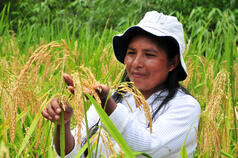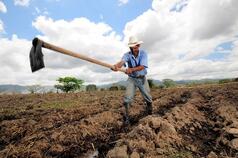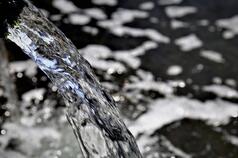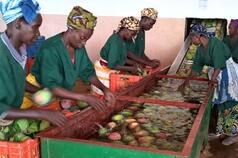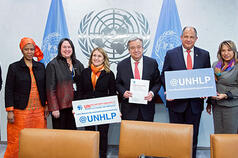Presentation made during the GFAR/IICA joint workshop: Enabling innovation for sustainable agricultural development in the Americas within a global context, held at FAO Headquarters, Rome, on 10 February 2017
Presentation made during the GFAR/IICA joint workshop: Enabling innovation for sustainable agricultural development in the Americas within a global context, held at FAO Headquarters, Rome, on 10 February 2017
Presentation made during the GFAR/IICA joint workshop: Enabling innovation for sustainable agricultural development in the Americas within a global context, held at FAO Headquarters, Rome, on 10 February 2017
The American Region is characterized by having some of the most advanced agricultural research capabilities worldwide. The Region produces the largest surpluses of food in the world, that compensate the food deficits encountered primarily in Asia, the Middle East and Africa.
Watch this interview with Dr. Victor Villalobos, Director General of IICA, who opened the recent GFAR-IICA Joint Workshop on "Enabling Innovation for Sustainable Agri-Food Development in the Americas within a Global Context". Dr. Villalobos shared with us how he sees IICA's role in leveraging actions with Partners in GFAR in Latin America and the Caribbean, his ideas for specific Collective Actions that can be realized in the coming years, and the benefit that GFAR's new governance structure will bring to IICA's and partners' work.
The Joint Workshop was held back- to- back with the meeting of the Steering Committee of GFAR and co-organized by GFAR and IICA Secretariats. The aim of this Workshop was to discuss how, in practice, existing capacities could be better mobilized through Collective Actions in agri-food research and innovation, addressing the American Region’s key needs, and how the stakeholders can best contribute to GFAR’s aims in an effective manner.
The announcement of World Water Day defines wastewater as “water from our homes, cities, industry and agriculture that flows back to nature polluting the environment and losing valuable nutrients and other recoverable materials”.
The International Center for Biosaline Agriculture (ICBA), a Partner in GFAR, evaluates alternative water sources, including treated household wastewater, seawater, groundwater and industrial produced water for agriculture. Instead of waste products, ICBA sees this water as a ‘valuable resource’.
It is expected that by 2050, there will be around nine billion people living on our planet. In order to ensure that they all have enough food, it is vital that the economic development of rural areas is accomplished with good result.
Rural areas offer a great abundance of natural resources, both for the current generation and for future ones. Furthermore, they also offer great potential for development. For example, the spread of digital technologies and regional trade, and in particular the local processing of raw materials and agricultural products, can benefit rural areas.
The final report to the UN Secretary-General's High-Level Panel (HLP) on Women’s Economic Empowerment has now been published, stressing that building women’s economic empowerment must be done in ways that leaves nobody behind, particularly the most marginalized women at the bottom of the pyramid.
The report, entitled “Leave No One Behind: Taking Action for Transformational Change on Women’s Economic Empowerment”, also acknowledges that gender inequalities remain persistent across the world, but they can be overcome if barriers are removed.

